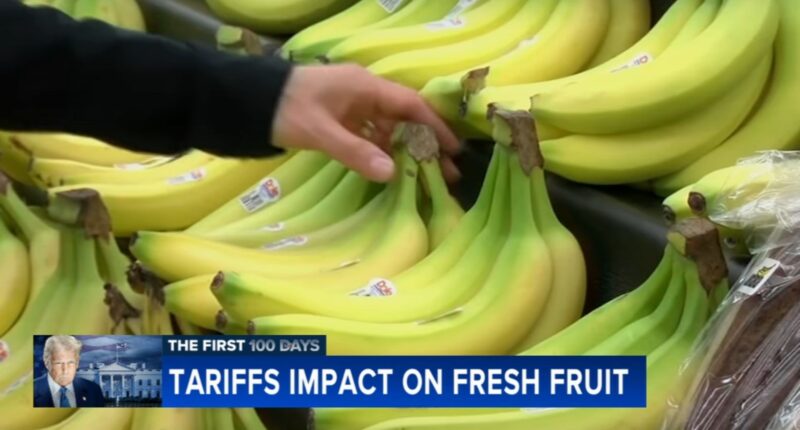PHILADELPHIA — Despite our political differences, most of us can acknowledge the significant changes in the federal government over the past four months.
During President Trump’s initial 100 days in office, there have been substantial reductions in the federal workforce, a restructuring of foreign policy, intensified immigration control, and extensive imposition of tariffs.
The impact of tariffs on everyday items like groceries can be seen at the Packer Marine Terminal at the Port of Philadelphia.
Its strategic size and close proximity to shipping routes from South America and Central America have contributed to its emergence as the primary destination for fruit imports in the whole nation.
We are talking about apples, grapes, pears, plums and bananas.
So, with the 10% tariffs imposed on many of the countries that export these goods such as Mexico, Costa Rica, Chile, Argentina, New Zealand, when might you see prices go up at the grocery store?
“We’re talking about fruits and produce, especially where the supply chain is pretty short, where it will likely go to a wholesaler to a grocer directly, it would be like adding a 10% sales tax on the goods,” said Thomas Bridges, an asst. economics professor at the University of Delaware. “Except on your receipt, you wouldn’t get a separate line for it.”
RELATED: Trump giving ABC News 1st broadcast interview at 100 days mark
President Donald Trump is giving the first broadcast interview at the 100 days mark to ABC News.
Because they are perishable goods, fruit cannot be stockpiled. Therefore, Bridges says, these are the products you will see rise in price first.
However, Bridges says don’t expect stores to simply hike every single type of fruit at a full 10% to cover or absorb the new tariffs.
“Grocery chains are an incredibly competitive market, and so they don’t want to be scaring off consumers by rising prices on goods that consumers keep track of,” Bridges said.
Some could rise in price slightly, others could see price reductions to entice consumers, while others could absorb the cost of tariffs in other ways, like finding better efficiencies.
The speed of the fruit trade also works the other way too, says Bridges.
If President Trump suddenly decides to reduce tariffs, fruit would be among the first to see price reductions.
Bridges says most economists agree with him on this point: starting a tariff war with your trading partners could run the risk of sparking new inflation and likely won’t lead to a new manufacturing renaissance for American workers.
“A lot of the reduction in those workforces though have been driven by technology improvements like single-arm robots you see in like the auto manufacturing facilities,” said Bridges.
Philadelphia does not host much Chinese shipping at all. Ships from Asia tend to visit the massive ports of Los Angeles and Long Beach. How the Trump tariffs may impact your next iPhone, your next car or your next pair of shoes is a whole other story.
Trump giving ABC News 1st broadcast interview at 100 days mark
President Donald Trump is planning to sit down with ABC News in the first broadcast interview marking 100 days in office for his second term.
ABC News Senior national correspondent Terry Moran will conduct the interview in the Oval Office, which will air as a primetime special – “President Trump the First 100 Days: The Interview in the Oval Office” – on Tuesday, April 29, at 8 p.m. EDT/7 p.m. CDT on ABC. The exclusive sit-down will stream on ABC News Live, Hulu and Disney+ later that evening.
Copyright © 2025 WPVI-TV. All Rights Reserved.

















